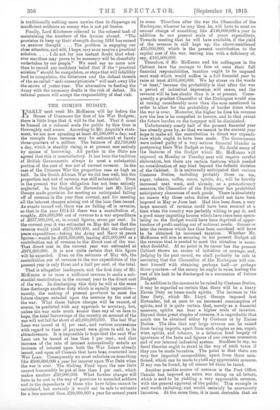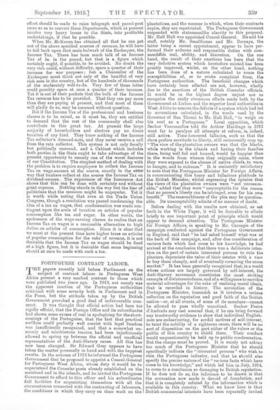THE COMING BUDGET.
FM:MY next week Mr. McKenna will lay before the House of Commons the first of his War Budgets; there is little hope that it will be the last. That it must be framed on a colossal scale the public by this time is thoroughly well aware. According to Mr. Asquith's state- ment, we are now spending at least £3,500,000 a day, and the receipts from revenue may be estimated at barely three-quarters of a million. The balance of £2,750,000 a day, which is steadily rising, is at present met entirely by means of borrowing. All parties in the State are agreed that this is unsatisfactory. It has been the tradition of British Governments always to meet a substantial portion of the cost of war out of current revenue. In the case of the Crimean War the proportion rose as high as half. In the South African War we did less well, but the proportion met out of revenue was still substantial. Even in the present war this obligation has not been entirely neglected. In his Budget for November last Mr. Lloyd George made provision for meeting an anticipated falling off of revenue in the year then current, and for meeting all the interest charges arising out of the loan then issued. As events turned out, there was no falling off in revenue, so that in the year 1914-15 there was a contribution of, roughly, £24,000,000 out of revenue to a war expenditure of £357,000,000, or, in round figures, seven per cent. In the current year it was estimated on May 4th last that the revenue would yield £270,000,000, and that the ordinary peace expenditure—taking the Army and Navv at peace figures—would be £235,000,000, leaving £35,000,000 as a contribution out of revenue to the direct cost of the war. That direct cost in the current year was estimated at £978,000,000. It is now quite certain that this figure will be exceeded. Even on the estimate of May 4th, the contribution out of revenue to the war expenditure of the present year is only three and a half per cent. of the total.
That is altogether inadequate, and the first duty of Mr. McKenna is to raise a sufficient revenue to make a sub- stautial contribution in the current year to the direct cost of the war. In discharging this duty lie will at the same time discharge another duty which is equally imperative— namely, the making of present provision to meet the future charges entailed upon the revenue by the cost of the war. What those future charges will be cannot, of course, be predicted with any approach to accuracy, but, unless the war ends much sooner than any of us dare to hope, the total borrowings of the country on account of the war will not fall far short of £2,000,000,000. The last War Loan was issued at 41 per cent., and various concessions with regard to time of payment were given to add to its attractiveness. It is impossible to hope that the next. War Loan can be issued at less than 5 per cent., and that increase of the rate of interest automatically entails an increase of interest upon both the War Loans already issued, and upon all Consols that have been converted into War Loan. Consequently we must calculate on something like £100,000,000 a year for interest upon War Debt when the war is over. The Sicking Fund upon the new Debt cannot honourably be put at less than 1 per cent., which makes another £20,000,000. What further charges will have to be met in the way of pensions to wounded soldiers and to the dependants of those who have fallen cannot be calculated, but certainly it would not be safe to estimate for a less amount than £20,000,000 a year for several.years to come. Therefore after the war the Chancellor of the Exchequer, whoever ho may then be, will have to meet an annual charge of something like £140,000,000 a year in addition to our present scale of peace expenditure. Towards meeting that he will have available, if the yield of the revenue is still kept up, the above-mentioned £35,000,000, which is the present contribution to the capital cost of the war, leaving him with a deficiency of, say, £105,000,000. Therefore, if Mr. McKenna, and his colleagues in the Cabinet have the courage to face at once their full financial responsibilities, taxation ought to be imposed next week which would suffice in a full financial year to raise at least £105,000,000, We lay stress on the words "at least," because the probability is that after the war a period of industrial depression will ensue, and the revenue will be less elastic than it is at present. Conse- quently a prudent Chancellor of the Exchequer would aim at raising considerably more than the sum mentioned in order to allow for the probability of harder times when the war is over. Moreover, the higher he fixes his revenue now the less is he compelled to borrow, and to that extent the future burden on the taxpayer will be diminished. Unfortunately nearly half of the present financial year has already gone by, so that we cannot in the current year hope to make all the contribution to direct war expendi- ture which ought to have been made. The Government were indeed guilty of a very serious financial blunder in postponing their War Budget so long. No doubt many of the features of the Budget which Mr. McKenna will expound on Monday or Tuesday next will require careful elaboration, but there are certain features which needed no consideration of any kind beyond the definite decision of the Cabinet. It is universally anticipated that various Customs Duties, including probably those on tea, sugar, tobacco, coffee, cocoa, spirits, ak., will be heavily increased next week, and already, as a precautionary measure, the Chancellor of the Exchequer has prohibited anticipatory clearances of such goods. There is absolutely no reason why these extra duties should not have been imposed in May or June last. Had this been done, a very large amount of revenue could have been secured at a, time when the country was perfectly willing to pay it, and a good many importing houses which have since been specu- lating' on the Budget would have been deprived of oppor- tunities of profit-making out of national needs. Sooner or later the revenue which has thus been sacrificed will have to be obtained by increased taxation. Whether Mr. McKenna will aim at securing in. his present Budget all the revenue that is needed to meet the situation is some- what doubtful. At no point in its career has the present Cabinet shown an excess of initative or courage, and, judging by the past record, we shall probably be safe in assuming that the Chancellor of the Exchequer will con- tent himself with obtaining perhaps half—or perhaps three-quarters—of the money he ought to raise, leaving the rest of his task to be discharged in a succession of future Budgets.
In addition to the revenue to be raised by Customs Duties, it may be regarded as certain that there will be a heavy Excise Duty on home-made spirits. The increase in the Beer Duty, which Mr. Lloyd George imposed last November, led at once to an increased consumption of spirits, and it is quite certain that, merely as a financial measure, spirits can bear a higher scale of taxation. Beyond these great staples of revenue, it is improbable that much can be obtained either by Customs or by Excise Duties. The idea that any largo revenue can be raised from taxing imports, apart from such staples as tea, sugar, wine, spirits, and tobacco, is a delusion bred largely of ignorance of the facts and figures of our oversee commerce and of our internal industrial system. Needless to say, no fiscal theories ought to stand in the way of such taxes if they can be made lucrative. The point is that there are very few imported commodities, apart from those men- tioned, which can be made to yield any appreciable revenue. If any can be found, by all means let them be taxed.
Another possible source of revenue is the Post Office. Canada has imposed an extra war stamp on all letters, which is said to be yielding a very appreciable revenue, with the general approval of the public. This example is well worth imitating, and would certainly be enormously lucrative. At the same time, it is most desirable that an effort should be made to raise telegraph and parcel-post rates so as to convert these Departments, which at present involve very heavy losses to the State, into profitable undertakings, if that be possible. When Mr. McKenna has obtained: all that. he. can get out of the above specified sources of revenue,:he will have to fall back upon that main bulwark of'the Exchequer, the Income Tax.. There has been much. talk of an. Income. Tax of 5s. in the pound, but that is a. figure. which certainly ought, if possible, to be avoided.. No-doubt the. -very rich could, without difficulty, spare. a. quarter of their incomes for war purposes ; but a Chancellor- of the Exchequer must think not only- of the. handful. of very rich men in the country, but of the hundreds of thousands of the moderately well-to-do. Very few. of these. latter could possibly spare. at once a- quarter of their incomes. .Yet it is out of their pockets that the bulk. of. the- Income- Tax revenue has to be provided.. That they can pay more than they are paying at present,. and. that most. of. them will gladly do so, may be assumed without question..
But if the Income Tax of the professional and.. business classes is to be raised, as it must be,. they are entitled to demand that the rest of the community shall also contribute to this great tax._ At. present. the large majority of householders and electors pay no direct taxation of any kind. They know nothing of the Income Tax collector's demand-note, and they never. receive a call from the rate collector. This system is not only fiscally but politically unsound, and a Cabinet which. includes ,both parties in the State ought to take advantage of. the present opportunity to remedy one of the worst- features of our Constitution. The simplest method of dealing with the problem is to require employers to collect the Income Tax on wage-earners at the source, exactly in fir same- way that bankers collect at the source the Income. Tax on dividend-owners. The experience of the Insurance Act shows that this can be done with certainty and without great expense. Nothing stands in the way but the fear of politicians that the measure might be unpopular.. Yet it is worth while noting that even at the Trade. Union Congress, though a resolution was passed condemning the idea of a tax on wages, that condemnation. was made con- tingent upon the scale of taxation on articles of popular consumption like tea and sugar.. In other words, the spokesmen of the wage-earning classes do realize that an Income Tax on wages is a reasonable alternative to high duties on articles of consumption. Since it is clear that we must at the present time have higher taxes on articles of popular consumption for the sake of revenue, it is not desirable that the Income Tax on wages should be fixed at a high figure, but it is desirable that some beginning should at once be made with such a tax..



































 Previous page
Previous page